Embark on a culinary adventure in Morocco and immerse yourself in the delightful world of Traditional Moroccan Dishes. When you visit this vibrant country, the diverse and flavorful Moroccan cuisine is an experience not to be missed. In this guide, we present a tantalizing array of the most popular Moroccan dishes that are a must-try during your stay.

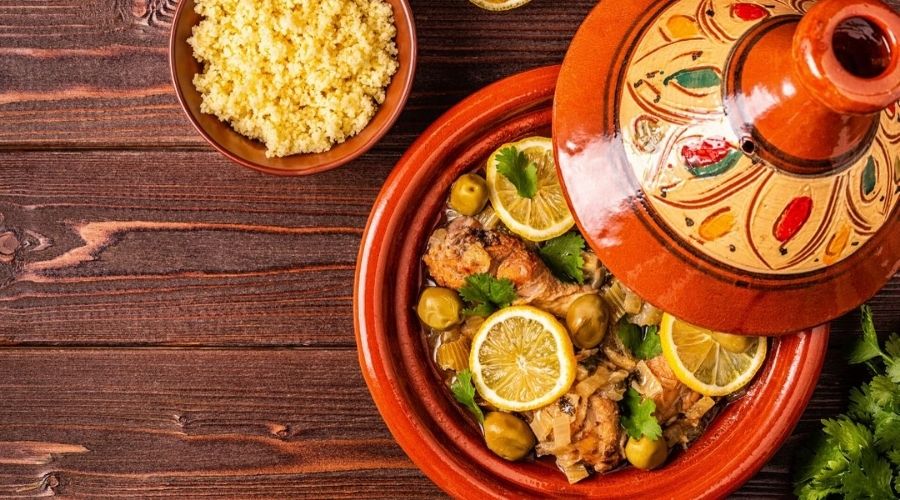
Indulge in Morocco’s most famous culinary creation, Tagine. Slow-cooked in a clay pot with a conical lid, this dish features a medley of vegetables, spices, and various meats, including beef, chicken, and lamb. Available at roadside stops, cafés, and upscale restaurants, Tagine captures the essence of Moroccan cuisine.
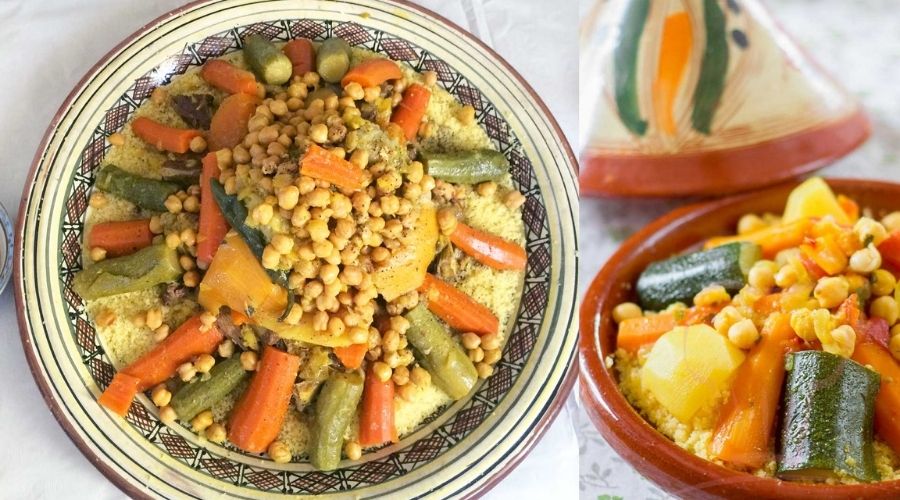
A culinary amalgamation of meat, vegetables, and steamed couscous grains, Couscous is another popular Moroccan delight. Despite its simplicity, the dish bursts with robust flavors, offering a delightful combination of textures and tastes.
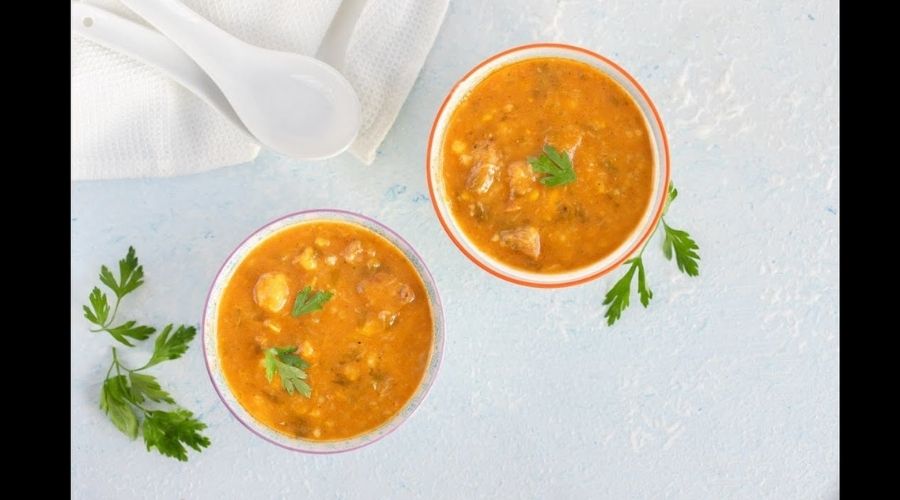
Embark on a journey of flavors with Harira, a famous Moroccan soup. This tomato-based creation, served with chicken and lentils, combines rice or thin noodles in a hearty beef or lamb broth. Traditionally enjoyed as a starter, Harira holds a special place, especially during the month of Ramadan.
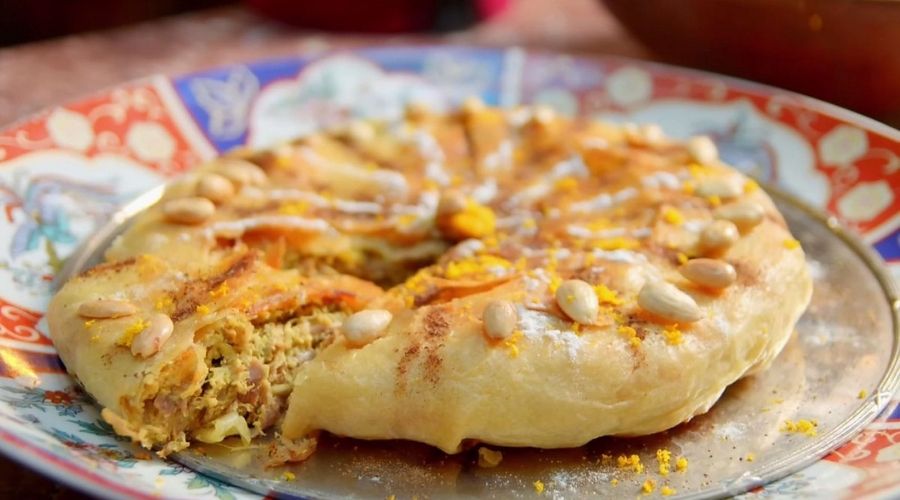
Immerse yourself in the rich history of Fassi (Fes) cuisine with Bastilla, a symbol of Moroccan culinary heritage. This intricate pastry, filled with chicken, eggs, almonds, and spices, occasionally enriched with fish, is a savory delight often sprinkled with sugar and cinnamon. Best enjoyed on special occasions.
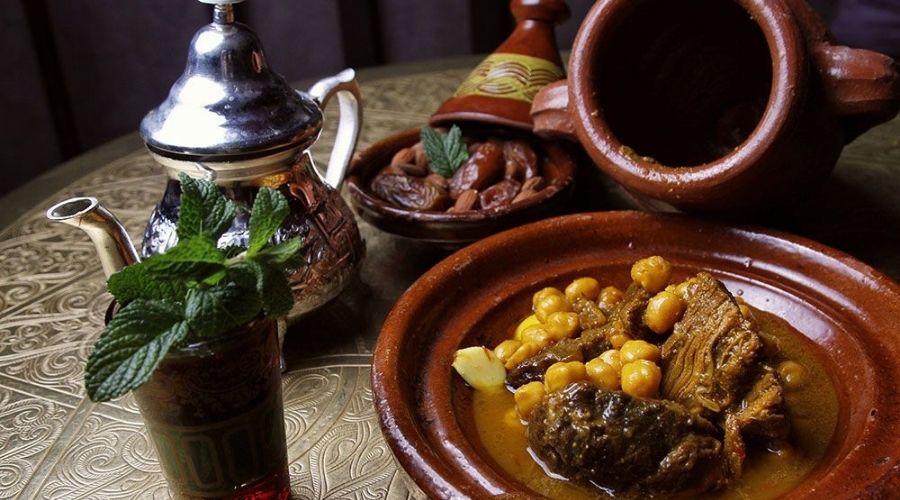
Experience the culinary excellence of Marrakech with Tanjia, a dish prepared with meat, garlic, cumin, saffron, and lemon. Cooked in a distinctive pottery-shaped pot in traditional ovens, Tanjia is served hot, offering a taste of Marrakech’s authentic flavors.
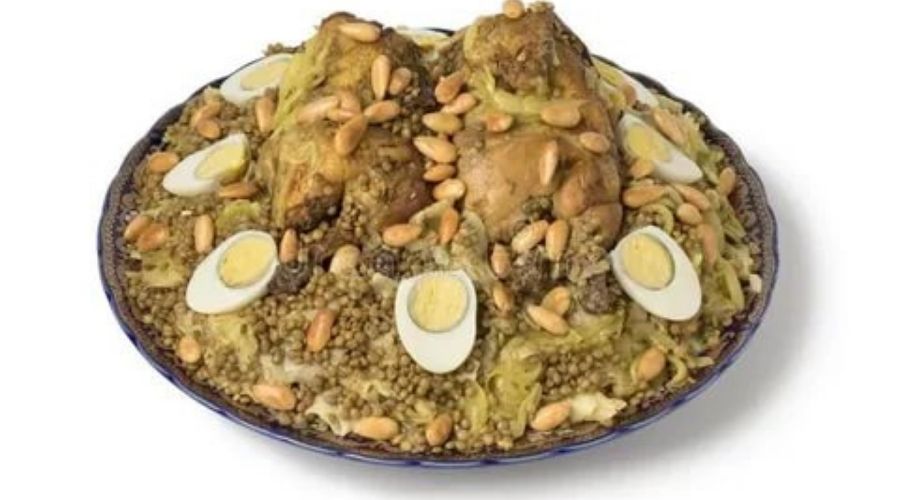
Delight in one of the best-loved Moroccan dishes, Rfissa. This slow-cooked creation features chicken with lentils marinated in high temperatures, infused with fenugreek, saffron, and cumin, all atop a bed of bread. While traditionally served to new mothers, it’s a treat available for enjoyment at any time.
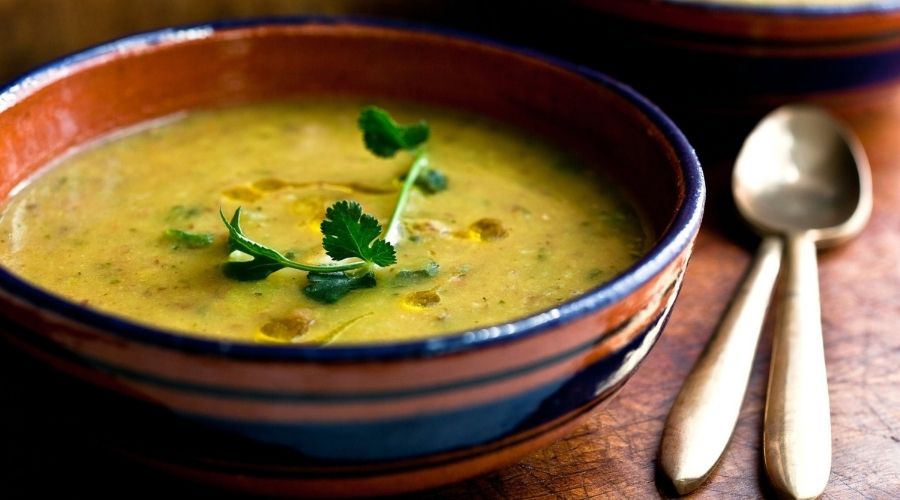
In the northern and eastern regions of Morocco, savor the popular delicacy of Bissara. Primarily made from beans or galbanas, this nutritious meal requires the addition of olive oil and a touch of breezes for an extra layer of flavor.
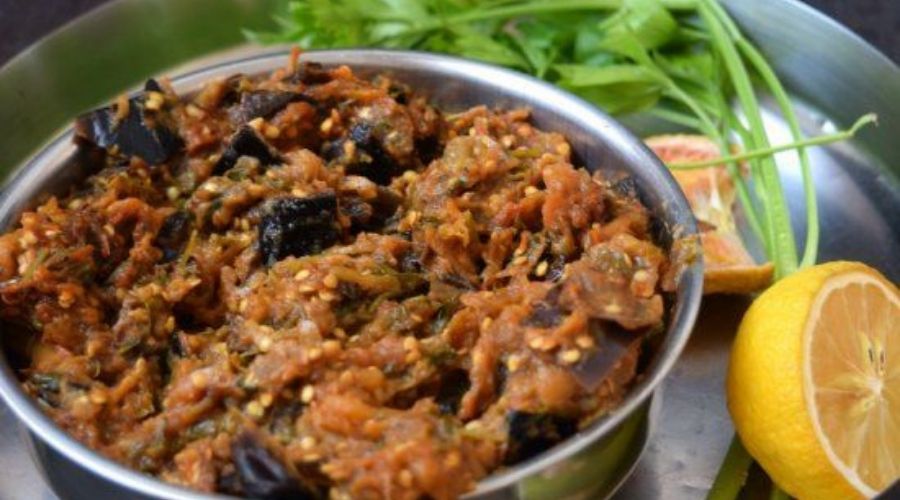
Zaalouk, one of the most famous Moroccan dishes, presents a refreshing salad made from grilled or fried eggplant, tomato sauce, roasted pepper, garlic, and delightful Moroccan spices. Enjoy it cold with Moroccan bread, either as a prelude or accompaniment to main dishes.
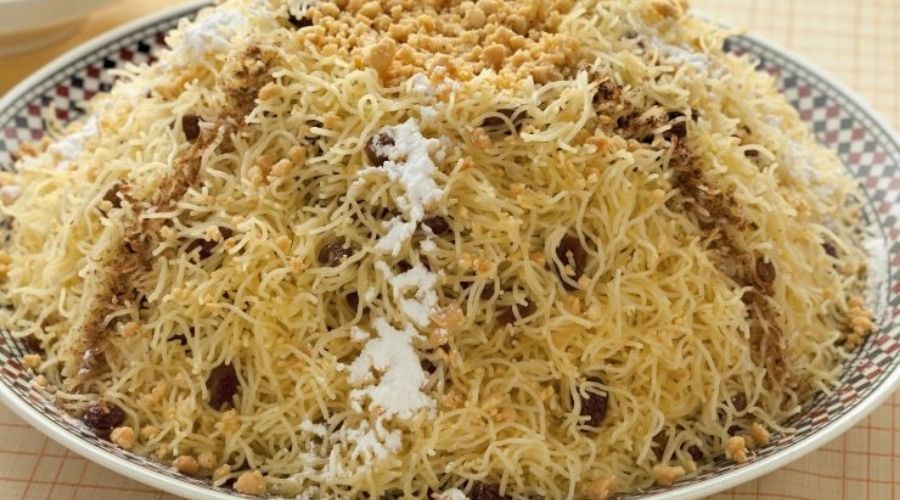
Enhance your culinary experience with Seffa, a Moroccan specialty often served during special occasions between the main course and dessert. Uncover the unique recipe that adds a touch of celebration to your dining experience.
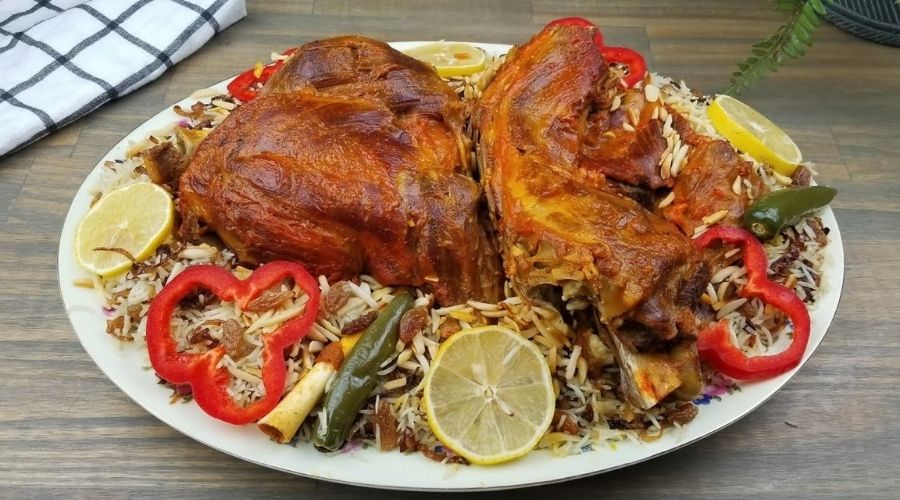
Immerse yourself in the tradition of Morocco with Mechoui, a traditional lamb barbecue often served at Moroccan weddings. More than a specific recipe, it represents a cooking method that showcases the culinary expertise of Morocco.
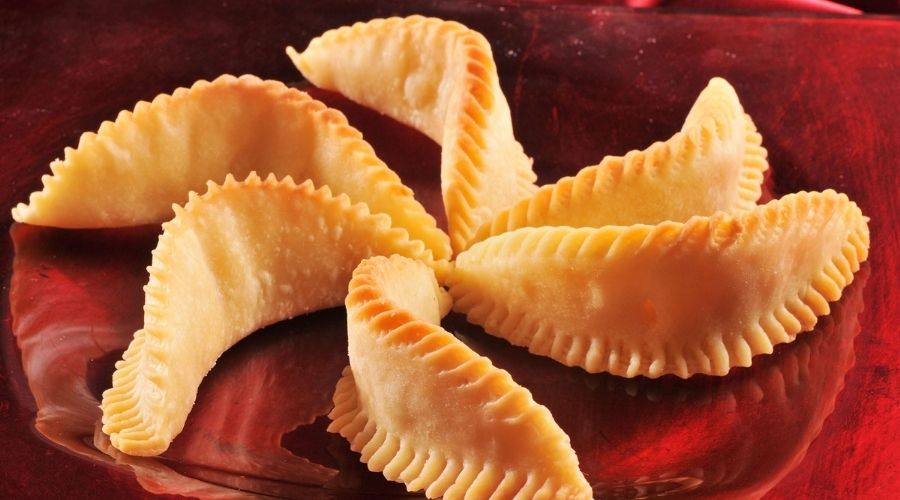
Explore the sweet side of the Traditional Moroccan Dishes with Kaab El Ghazal, delicious gazelle horns prepared with almonds and coated with shortbread enriched with orange blossom. A delightful treat, especially when paired with a soothing mint tea.
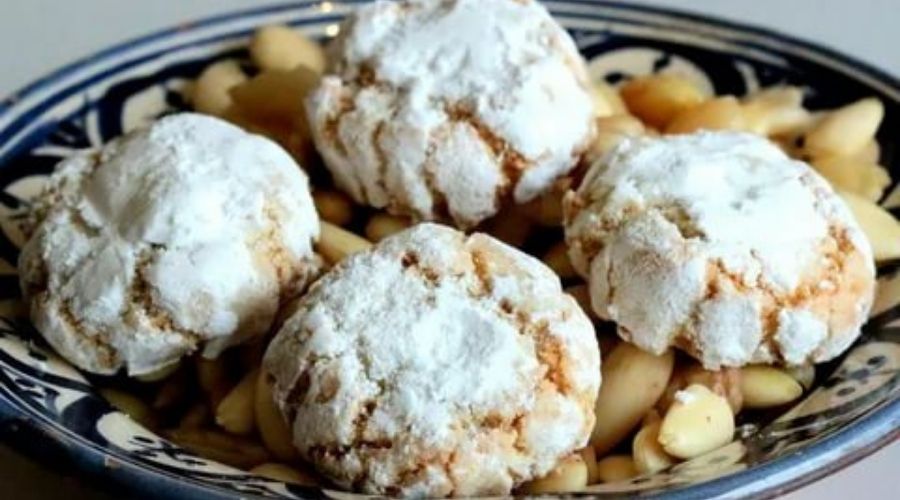
Indulge in the tasteful experience of Ghriba, a pastry inspired by an Andalusian specialty. In Morocco, it is prepared with vegetable oil, making it a cupcake served on special occasions like engagement parties or weddings.
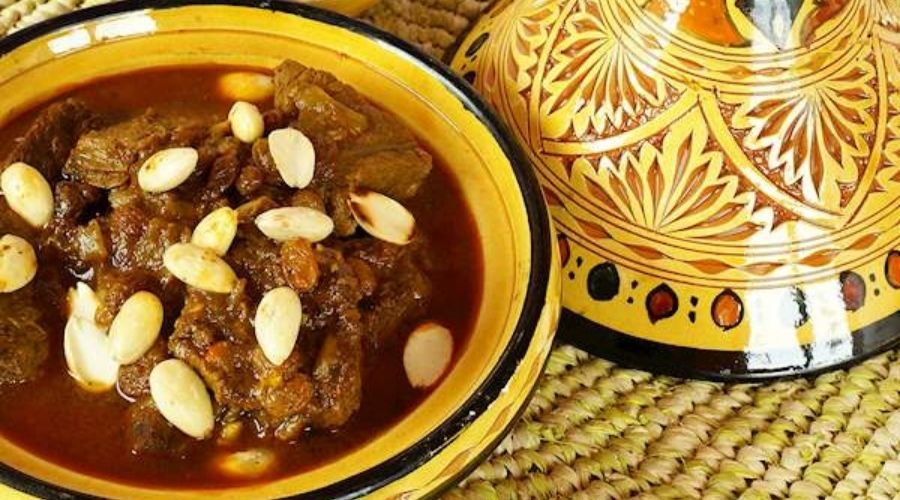
This is a very special recipe for Moroccan tagine, traditionally served during the festival of Eid el-Kebir and prepared with lamb neck, almonds, raisins, honey and cinnamon, the whole being subtly balanced by the blend of Ras-El-Hanout. The dish is prepared days before the party, the meat having to cook for long hours, to come off effortlessly. In the traditional recipe, kidney fat was added to form a protective film, which kept the dish at a time when there was no refrigerator.
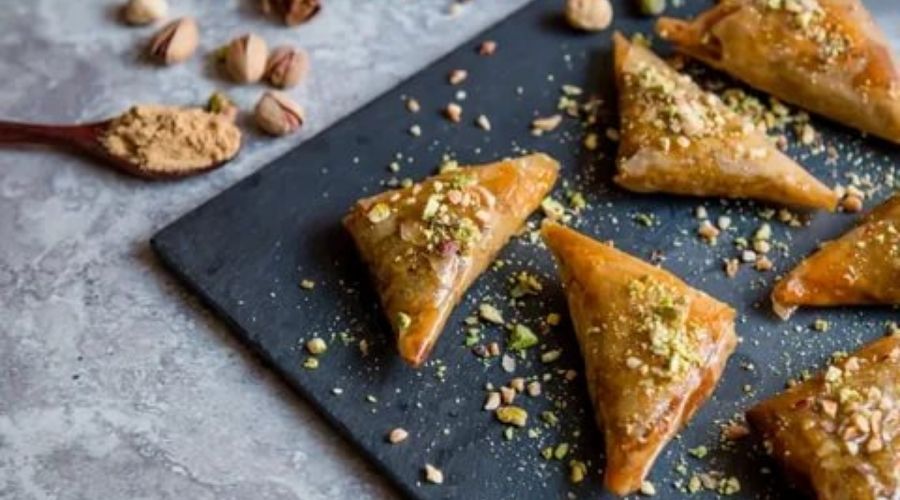
Briouate, or briwate, is a flaky triangle that can be both sweet and savory. Originally from Fez, its most common version consists of almonds, sugar, orange blossom water, and cinnamon, all wrapped in a sheet of Moroccan Bastilla. Briouates with seafood are also very popular. There are other recipes where the triangles are stuffed with minced meat, chicken, cheese, or vegetables.
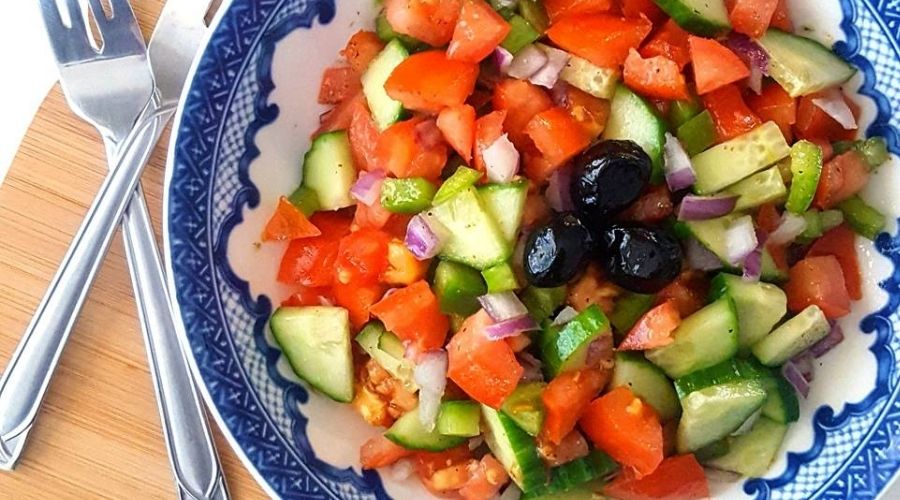
During Traditional Moroccan Dishes, many salads are served before or during the dish, hot or cold. Whether simple or complex, all bring a touch of freshness and allow Moroccans to eat a lot of vegetables. Cucumber tomatoes, cumin carrots, eggplant zaalouk, zucchini with hazelnuts, celery mushrooms, and orange lentils … once again, the variations are endless!
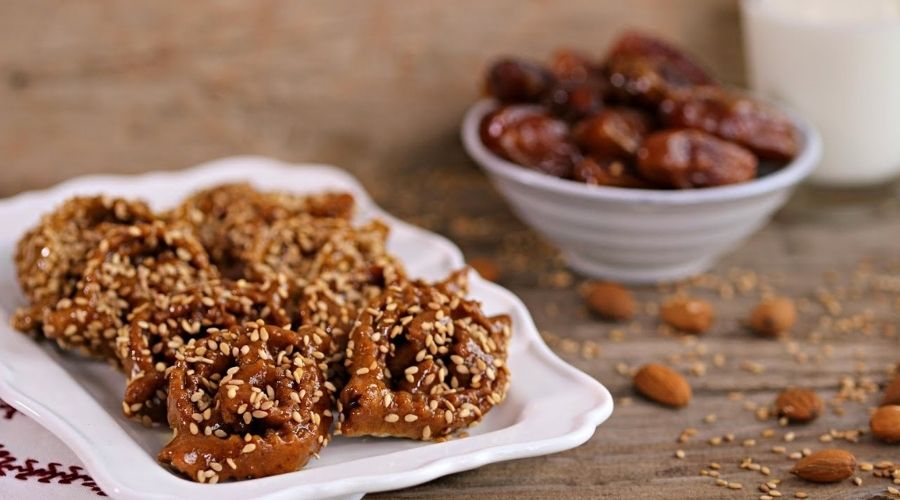
Moroccan dessert dishes are quite light. Chebakia is, with almond briouate, the flagship pastry of Ramadan. The dough, made with wheat flour, eggs, orange blossom water, anise, and almond, is fried in vegetable oil, then covered with honey and sesame seeds. It is also one of the cheapest and most common cakes in Morocco.
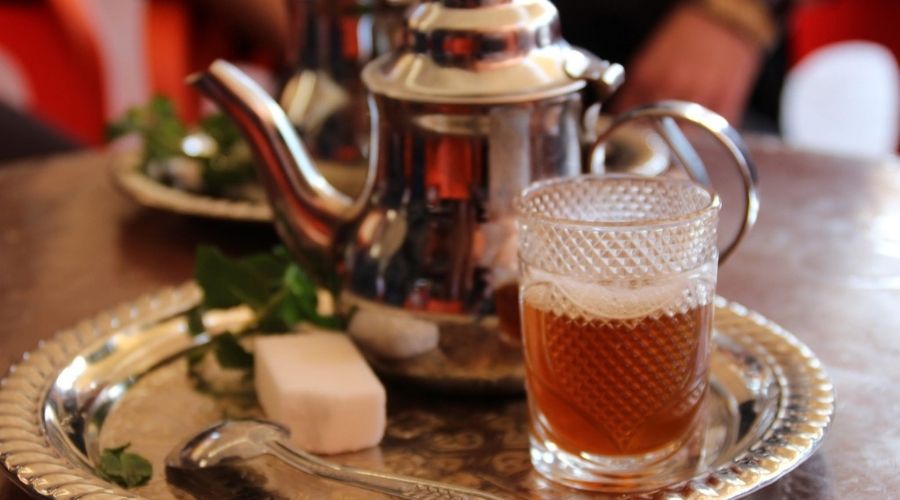
Atay or mint tea is the national drink for Moroccans, as it drinks all day at breakfast, after lunch and afternoon, and is served in cafes, events, and holidays. Moroccan tea accompanies many pies and sweets, and mint can be replaced with other herbs, such as Shiba.
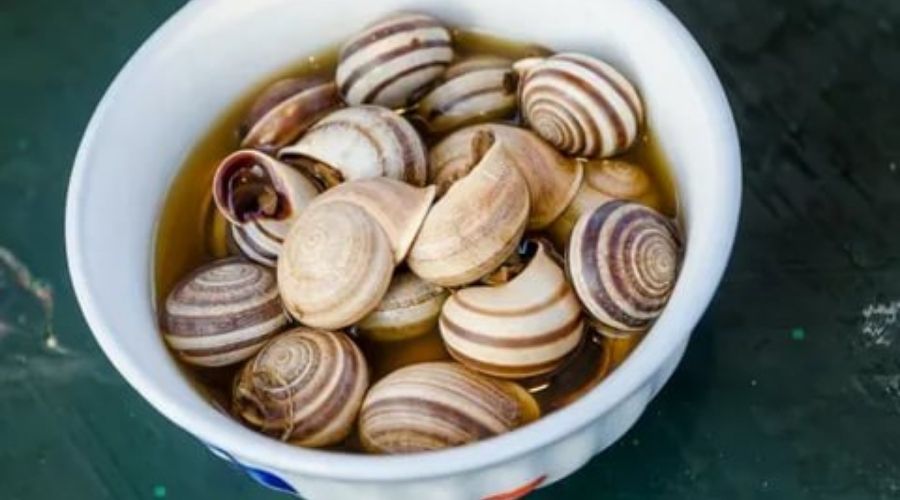
Snail soup is a Traditional Moroccan Dishes, you can find all over the country. Use a toothpick to pick out the snails from the shells, then slurp up to the soup. Locals believe the broth is good for digestion and fever.
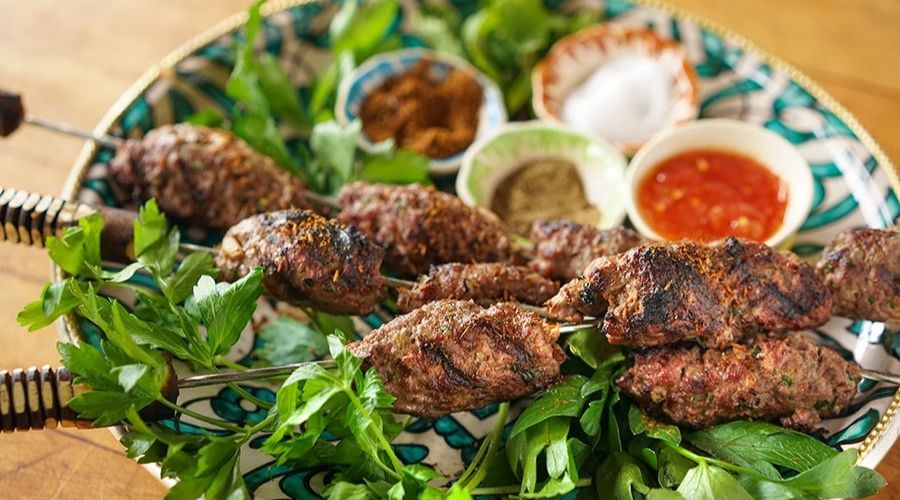
Flame-grilled chunks of lamb (kebab) and spiced minced meat made into a sausage and grilled on a skewer (kofta) are a favorite Traditional Moroccan Dishes. It is typically eaten with a simple chopped tomato and cucumber salad and a disc of flatbread.
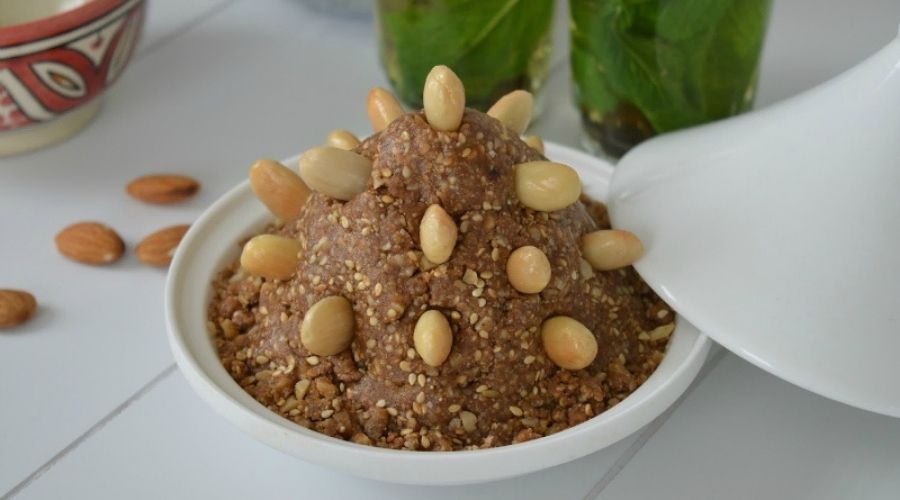
Sellou is a popular Moroccan sweet consisting of oven-browned flour, fried almonds, and toasted sesame seeds. The dessert is not baked, as all of the ingredients are combined instead. Rich and nutty, sellou acts as food that restores energy and health, which is the reason why it is traditionally served during Ramadan and at celebrations or special occasions.
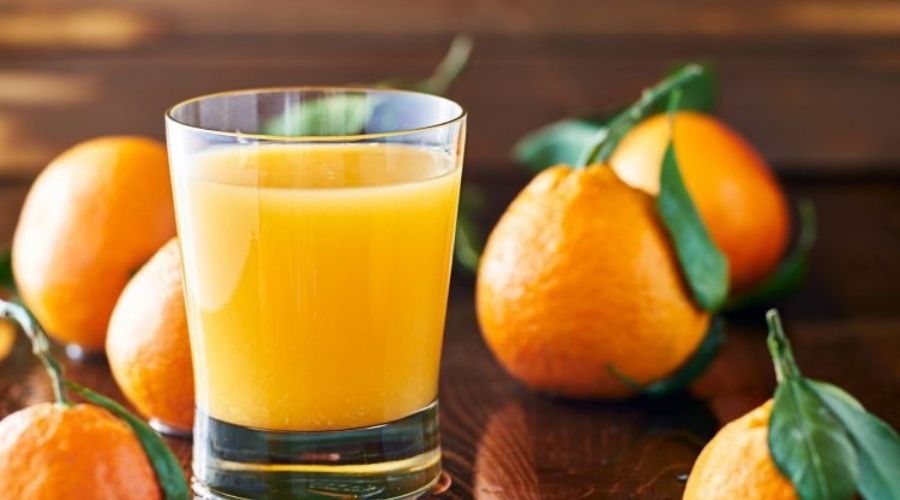
Orange is an essential part of Moroccan cuisine. It is served in all sauces, sweet or savory. It is also found in salads, served at the end of a meal. Oranges are mixed with sugar, cinnamon, orange blossom water, and a few mint leaves and make for a refreshing dessert after all the dishes we have just listed. Finally, the orange juices that can be found in the markets of Marrakech or on the Jema El Fnaa Square are absolutely delicious.

Yes, it is very safe Morocco is the embodiment of one of the safest countries in the world, thanks to the combination of the country where the crime rate is very low and its government that is always proactive in protecting their guests and locals.
You should bring a brimmed hat and sunglasses if you not used to the Moroccan sun &pack everything you could ever need and put in a small bag so you could move easily between your destinations.
We have experience in vacation planning for more than 10 years & our staff consists of the most professional operators, guides, and drivers who dedicate all of their time & effort create the perfect vacation. All of our tours are customized by Travel, Financial & Time advisors to fit your every possible need during your time in Morocco. we always keep in mind that your safety & comfort are our main priority until you return home.
Morocco’s rainy season begins in November and runs through March, and parts of the country even get cold enough for snow to fall on the highest peaks. However, while this season is wet for Morocco, there’s still just an average of 2 inches of rain per month.
Morocco in 5-7 Days
A few more days in Morocco means that you can cover more ground in the country. Or that you can linger longer in a particularly fascinating destination like Fes, a city that ends up becoming a favorite of many travelers.
Best Times to Visit Marrakech. The best times to visit Marrakech are from March to May and between September and November. These shoulder seasons are known for their desirable weather (with average daytime temps in the low 70s to low 90s) and affordable hotel rates.
The month with the lowest average high temperature is January (18.4°C). The month with the highest average low temperature is August (20.1°C). The coldest month (with the lowest average low temperature) is January (5.9°C).
Souk is indeed market (there are local and tourist souks) and you could spend quite some time in the Marrakech souk. Marrakech also has D’Jemma al Fna which is unique in Morocco. … Weather is never predictable but generally, you can expect Marrakech to be warmer than Fez.
Tips are not mandatory, but are welcome, it will always be helpful. There is no specific amount of tips it is given depend on the generosity and the capability of customers without forgetting the satisfaction of the service provided by the staff (drivers and guides).
Morocco is perfect for travel all year long! Given the country’s geographic variety, there is always a region where the climate is mild. We can recommend the best destination for you based on the weather and your travel dates. In winter, you’ll want to head south to the desert. Nights can be chilly but during the day you’ll enjoy the sun and blue skies bereft of clouds. In summer, the Atlantic coast is generally balmy and it is the best season for treks in the Atlas. At over 1800m in altitude freshness is a safe bet! That being said, nothing is stopping you from discovering the Moroccan desert as long as you choose the right accommodation and can adapt to the heat.
Upmarket restaurants, shops and hotels or riads in Morocco usually accept debit cards. Those that do are most likely to accept Visa or MasterCard however may apply a surcharge to cover the cost of processing your transaction. Amex is not a popular card.
Morocco is much more western in dress than ever before. Although it is still a dominantly Islamic country, it’s best to cover yourself outside the large city centers. The locals here are truly used to seeing tourists, and you’ll never feel uncomfortable or out of place. They’re glad you’re here. In the hot summer months, we’d suggest you wear light, loose, cotton, or linen to stay as cool as possible. A hat or turban is a must in the sun to protect your head against the heat and sun. You look cool, we promise. In autumn and spring, a light jacket or fleece is recommended; the evenings can be quite cool when the sun goes down! In winter, warm clothing is a must.
There is no black money market in Morocco. … Euros and (US and CAD – not Australian) dollars are always accepted in Morocco and you will save time bringing cash, doing away with long slow bank lineups or non-active cash machines to acquire dirhams. You can also use your debit card at bank machines.
Upmarket restaurants, shops and hotels or riads in Morocco usually accept debit cards. Those that do are most likely to accept Visa or MasterCard however may apply a surcharge to cover the cost of processing your transaction. Amex is not a popular card.
Travel insurance should be obtained before leaving your country of origin. We don’t force anyone to purchase it. Local hospitals have limited diagnostic capability. Private clinics can be expensive, evacuation can cost a lot and luggage can disappear, so insurance is a good idea.
Internet cafes are widely popular in Morocco, making it easy for visitors to access the internet. Internet Café’s generally open early and close late, and usually charge approximately 3-5 Dirhams per hour. Many hotels also offer wireless access.
Although a predominantly Muslim country, Morocco is not dry. Alcohol is available in restaurants, liquor stores, bars, supermarkets clubs, hotels, and discos. Some Moroccans enjoy a drink although it is disapproved in public places. The local brew of choice carries the highly original name of Casablanca Beer.
The legal drinking age is 18
Ramadan is a special time of year for Muslims that should be celebrated by non-Muslims and feel the essence of the Islamic culture. You can fast with the Muslim or just observe but you are always welcome to join the celebrations and festivals.
Do not hesitate to give us a call. We are an expert team and we are happy to talk to you.
(+212) 672 356 304
Viajesmorocco@gmail.com
